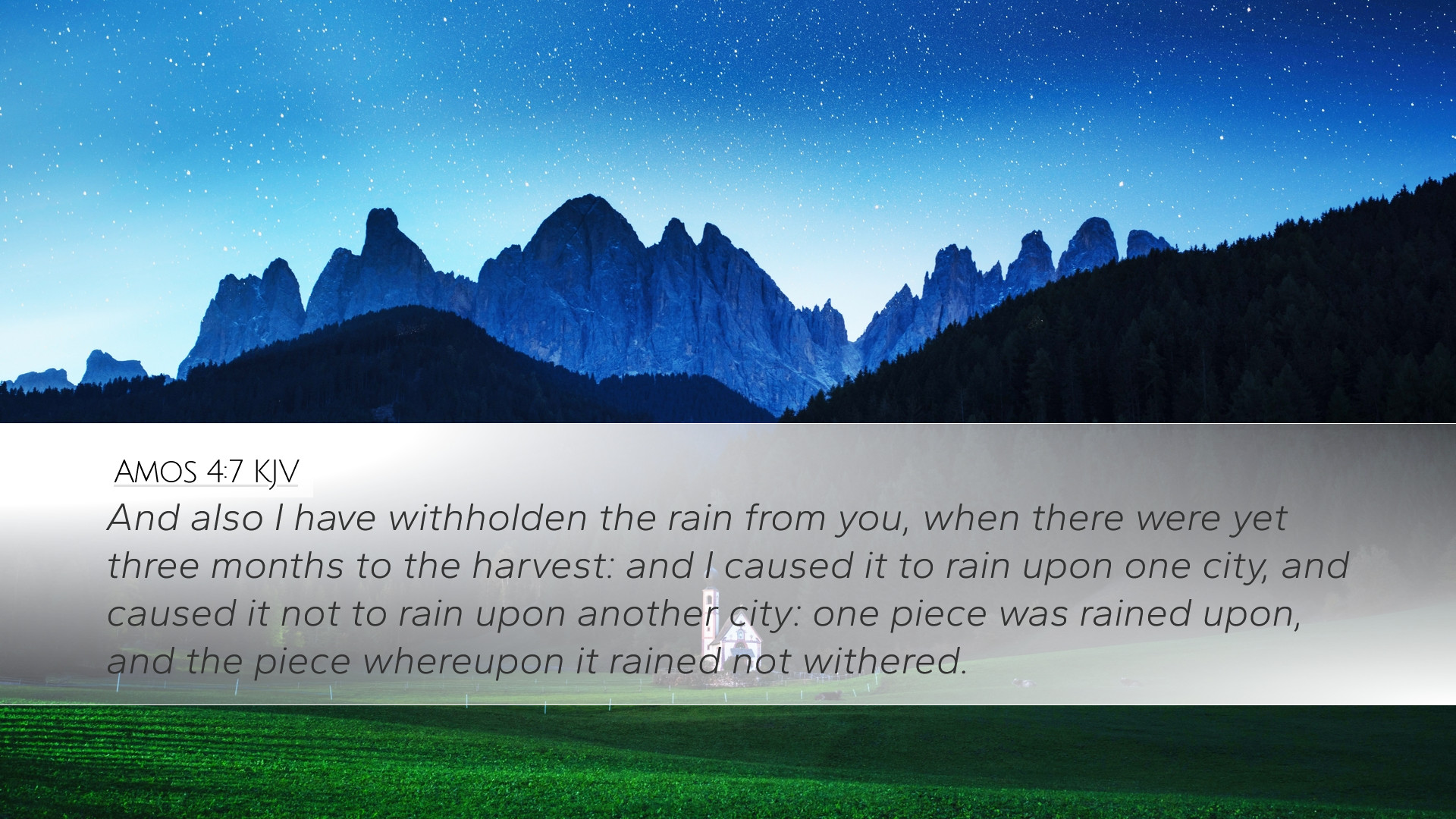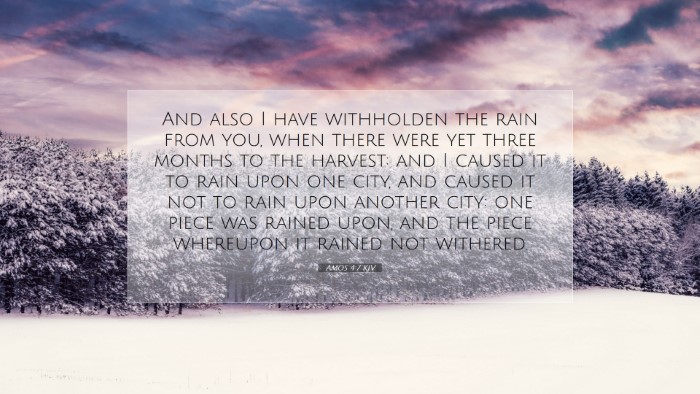Old Testament
Genesis Exodus Leviticus Numbers Deuteronomy Joshua Judges Ruth 1 Samuel 2 Samuel 1 Kings 2 Kings 1 Chronicles 2 Chronicles Ezra Nehemiah Esther Job Psalms Proverbs Ecclesiastes Song of Solomon Isaiah Jeremiah Lamentations Ezekiel Daniel Hosea Joel Amos Obadiah Jonah Micah Nahum Habakkuk Zephaniah Haggai Zechariah MalachiAmos 4:7
Amos 4:7 KJV
And also I have withholden the rain from you, when there were yet three months to the harvest: and I caused it to rain upon one city, and caused it not to rain upon another city: one piece was rained upon, and the piece whereupon it rained not withered.
Amos 4:7 Bible Commentary
Commentary on Amos 4:7
Amos 4:7 reads: "And also I have withholden the rain from you, when there were yet three months to the harvest: and I caused it to rain upon one city, and caused it not to rain upon another city: one piece was rained upon, and the piece whereupon it rained not withered."
Introduction
This verse exemplifies the sovereign control of God over nature and His willingness to use creation to communicate His displeasure towards a wayward people. The prophet Amos addresses the disobedience of Israel and the judgments that follow divine displeasure. Insights drawn from a variety of public domain commentaries will enhance our understanding of this critical scripture.
Contextual Background
Amos prophesied during a time of relative prosperity for Israel, yet this prosperity was coupled with moral decay and social injustice. His message is a call to repentance and recognition of God’s authority. This specific verse serves as a reminder of God’s ultimate sovereignty and the consequences of national sin.
Commentary Insights
The Divine Withholding of Rain
Matthew Henry notes that the withholding of rain signifies God’s judgment. Rain is essential for crops, and during a dry season, it would represent God's displeasure and a warning to His people. He emphasizes that God’s sovereign control over weather signifies His power to bless or curse.
God's Selective Blessings
Albert Barnes highlights the idea of God’s selective rain as a metaphor for divine intervention. By allowing rain to fall on one city while withholding it from another, God exhibits His sovereignty and ability to act personally in the lives of nations. This selective blessing not only reminds Israel of their dependence on Him but also serves as a dramatic demonstration of divine favor versus judgment.
The Reminder of Accountability
Adam Clarke elaborates on how this verse serves a dual purpose—both as a message of warning and accountability. The failure of the Israelites to respond to previous afflictions is evident, and Clarke emphasizes the need for introspection as to why some cities prospered while others suffered. The disparity in rainfall is a heavenly commentary on their behavior before God.
The Spiritual Implication of Rain
Matthew Henry draws parallels between physical rain and spiritual rain, which is often associated with divine grace and blessings. Just as physical drought can lead to ruin, spiritual barrenness occurs when God’s favor is withheld due to sin. This highlights the importance of seeking righteousness to cultivate a relationship with Him.
The Consequences of Ignoring Divine Warnings
Albert Barnes points out that Amos’ audience likely had seen instances of God’s judgment in their neighboring cities, yet they remained unrepentant. Their hardened hearts led them to ignore the very signs intended for their awakening. This serves as a stern reminder to us—repeated signs of God’s disapproval should invoke a response rather than indifference.
God's Mercy Amid Judgment
Adam Clarke also notes that in the midst of judgment, God always provides opportunities for repentance. The mere existence of some rain indicates that not all was lost; some cities received His mercy. Thus, the response from the people could still mean a turnaround, showcasing God’s urge for reconciliation.
Theological Reflections
This verse raises crucial questions about divine sovereignty and human agency. How God interacts with nations and their responses is paramount in understanding divine justice. The juxtaposition of His blessings can teach valuable lessons about faithfulness and righteousness. Believers are reminded of the need to examine their lives against God’s standards.
Conclusion
Amos 4:7 serves as a profound reminder of God’s control over nature and the consequences of sin. The insights from the noted commentaries illuminate various facets of this scripture, encouraging pastors, students, theologians, and scholars to reflect deeply on the character of God, the reality of His judgments, and the hope of His mercy. The challenge remains for believers to remain sensitive to divine warnings and responsive to the voice of God pleading for righteousness.


